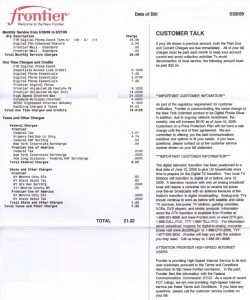Robert Cyran, writing for BreakingViews, is concerned about the profit capacity of telephone and cable companies in the coming years.
Noting that wired, high speed services often account for more than half the revenue of providers, anything that challenges those margins could provoke hostile reaction from Wall Street, dissatisfied with diminishing returns.
Cyran specifically calls out Frontier Communications, FairPoint Communications, and Qwest for not having wireless (mobile phone) divisions and for their high level of debt.
He’s also been absorbing Sanford Bernstein’s views on the telecommunications industry, which typically guarantees Verizon fiber-to-the-home cost bashing. And yes, it’s in there:
True, in urban areas where Verizon and AT&T are laying optical fibre, their fixed-line businesses are doing relatively well. Customers like super-fast internet connections, and the companies can pump bundles of services such as voice and television through it. But in rural areas, fibre is prohibitively expensive to lay, and customers without high-speed service options have more reason to rely solely on a mobile phone.
Verizon and AT&T won’t escape unharmed. Verizon is spending about $4,000 per customer to lay fibre.
Verizon is spending money on fiber service that customers like and are generating healthy revenues, but the fiber optics “harms” Verizon. At least the bashing is consistent.
Cyran claims cable’s biggest problem is that margins for their broadband divisions have been slowly dropping. Should customers defect en masse to competitors, things could get bad fast:
And when businesses like these with high fixed costs see customers defect, margins can contract quickly and even go negative.
One way to guarantee mass defections is to try to gouge consumers with Internet Overcharging schemes. In markets where equivalent levels of service are available, customers have the option of leaving the Overcharger behind for a more customer-friendly option. Unfortunately, not every market has equivalent competitors.
Cyran’s predictions for the future? Big troubles for Frontier, FairPoint, and Qwest who he predicts will see ongoing declines in their cash flow and increasing difficulty in paying back their debts. The companies will also struggle with the limitations of aging copper infrastructure to provide advanced class services (high speed broadband, video, and telephone) customers increasingly expect. In larger communities, many customers will leave for competitors who can provide those services (in these cases that means the cable company). In rural communities, customers will increasingly rely on cell phones as their only telephone line.
Fairpoint’s stock has fallen about 70% over the last 12 months and Hawaiian Telecom, which Carlyle bought in 2005, filed for bankruptcy at the end of last year. Yet Quest and Frontier’s stocks both still trade at more than 10 times estimated 2010 earnings. Since there’s little chance customer defections from wired telecom businesses such as theirs will stop, their stocks could have much further to fall.


 Subscribe
Subscribe

